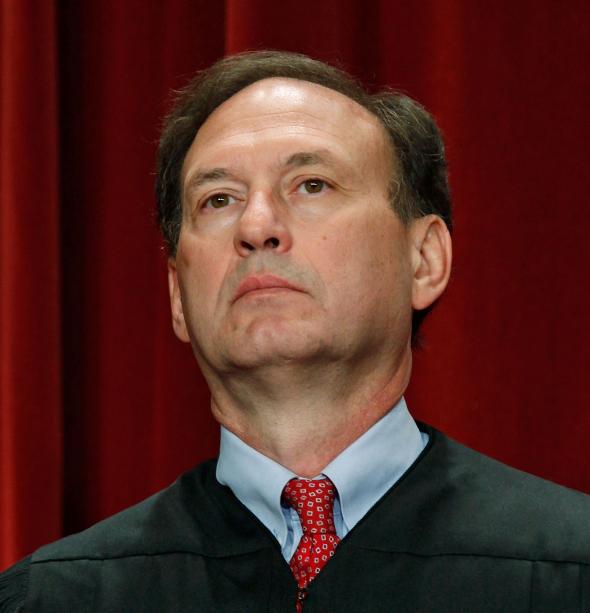When you think about anti-gay animus on the Supreme Court, you probably think of Justice Antonin Scalia’s stunningly homophobic opinions comparing homosexuality to murder, polygamy, animal abuse, drug addiction, incest, and prostitution. But in recent years, Justice Samuel Alito has emerged as a far savvier foil to Scalia, a consummate culture warrior with a cultivated air of civility. Where Scalia is bombastic and minatory, Alito is artful and prescient. Scalia bellows about the tragedy of his latest defeat; Alito quietly plans for the next battle. Long ago, Alito realized that anti-gay “religious liberty” was high on the religious right’s post-marriage equality agenda. And he’s already preparing for the coming constitutional showdown.
Alito’s latest sally came in the form of an address to the conservative Federalist Society. According to Josh Blackman’s transcription of the event, Alito waxed regretful over the court’s decision in Obergefell v. Hodges and bemoaned that “attitudes towards religious liberty” have shifted. Alito explained:
Over the past ten years, something quite dramatic has happened. An inkling was provided in CLS v. Martinez, a 5-4 decision. Hastings Law School threw the Christian Legal Society off campus because the society’s beliefs that members should hold traditional Christian beliefs on a variety of subjects, including on sexual relations, and only people of the opposite sex should be allowed to marry. The court allowed Hastings to get away with just that. It was an eye-opening decision. The claim of religious liberty could not stand up with an idea supported by influential segments of society.
This statement is quite revealing, most obviously because it is factually incorrect. Hastings did not throw CLS off campus. It informed the club that, in order to receive school funding, it “must open its membership to all students irrespective of their … sexual orientation”—as all clubs were required to do. CLS refused, maintaining that it would deny membership to students who partake in “unrepentant homosexual conduct.” Accordingly, Hastings—a public school funded with taxpayer money—declined to subsidize the club. CLS then sued, alleging a violation of its First Amendment right to free speech.
As these facts indicate, Hastings did not withhold funding from CLS because of its views that “only people of the opposite sex should be allowed to marry,” as Alito claims. Hastings withheld funding because CLS demanded a special right to discriminate against gay and bisexual students, a right which no other clubs held. CLS openly refused to let gay and bisexual students into its ranks. As a result, Hastings refused to spend public funds subsidizing its activities.
Alito’s complete mutilation of the facts in CLS, however, is less interesting than the context in which he brought the case up. In his address, Alito described CLS as a “religious liberty” case. It was not: It was a free speech case, largely about the expressive association rights of a student group. But, as ThinkProgress’ Ian Millhiser notes, Alito plainly views CLS as Hobby Lobby-esque: a conflict between the “religious freedom” of one group to discriminate, based on its religious beliefs, against other individuals. In Hobby Lobby, a business gained the right to deny female employees access to some forms of contraception through their own insurance. In CLS, a publicly funded Christian group sought to secure the ability to block gays and bisexuals from their membership rolls. Because of Justice Anthony Kennedy’s blind spot for sex discrimination, Hobby Lobby won and CLS lost. But had Alito had his druthers, discriminatory “religious liberty” would have won out both times.
Why is it fascinating that Alito would recast a free speech case as a “religious liberty” conflict? Because it proves that the canny jurist is already looking past marriage equality and ahead to Kim Davis, the cake wars—and beyond. Jurisprudentially, the court’s CLS may have rested on free speech grounds. But to Alito, it was a religious freedom case through and through. As his Obergefell dissent demonstrated, Alito views marriage equality, and gay tolerance in general, as a threat to religious liberty. Now he has confirmed that he favors the right of groups and businesses to employ free speech as a sword, to use the Constitution to justify otherwise unlawful discrimination. The justice knows the battle over Obergefell is over. But the fight to give anti-gay Americans a special right to discriminate is just beginning—and Alito has already positioned himself to lead the charge.
